BENTONVILLE — Jackson Taylor sees his graduation as a beginning.
Taylor, 45, of Rogers is one of the people who graduated Friday from Benton County’s Drug Court and Veterans Treatment Court. Ninety-seven people graduated over the past year from the drug court and eight from the veterans court.
Taylor finished the 15-month program without getting any sanctions for violating any rules. Taylor said he reached a point in his life where he asked to be allowed into drug court.
His request to be in the court came after a drug arrest. He didn’t want to look back at the reasons he ended up there.
“It’s not about the past for me,” Taylor said. “It’s about the future.”
Circuit Judge Tom Smith, who presides over the courts, said people with drug or alcohol addictions that have committed nonviolent and nonsexual charges can be referred to the court to determine their eligibility.
Taylor said drug court brought accountability into his life because participants have to be where they are supposed to be. Taylor described drug court as a program of honesty.
“If people are honest with themselves and the program, then they will make it through, but they will not succeed if they try to get through by being dishonest,” Taylor said.
The program is rigorous and demanding, he said. There’s no easy way to get through it, and time for games has to end for a person to succeed in the program, he said.
Jonni Tuttle, 35, of Bentonville completed the drug court program in February. She was one of the graduates recognized at Friday’s program.
Tuttle’s drugs of choice were opiates and methamphetamine. She has remained drug-free for 2½ years.
“The program completely opened my eyes to the help I needed,” Tuttle said. “The (the drug court staff) truly helped me through the process.”
Tuttle said she was able to maintain a full-time job while in the court, and she succeeded in getting her GED after being encouraged by drug court staff.
“Drug court gave me an opportunity to have my life back,” Tuttle said. “I knew it was possible, but I didn’t think it would happen. I’m grateful for drug court.”
Tuttle said she was scared when her time in drug court was coming to an end, but she’s continued to do what she learned in the program and remains on a successful and drug-free path.
“Treatment courts are a proven budget solution that stops the revolving door of arrest and incarceration for people with substance use and mental health disorders. They prove that justice is sometimes best served by connecting people to treatment and resources to help them turn their lives around,” said Carson Fox, CEO of the National Association of Drug Court Professionals. “Treatment courts save lives and resources and must be expanded to meet the growing need.”
Drug court participants are regularly and randomly tested for substance use, required to appear frequently in court for the judge to review their progress, rewarded for meeting goals and sanctioned for not meeting clearly stated obligations.
There’s been a transformation in Taylor with his participation in drug court. Taylor said he’s more outgoing and enjoys meeting and talking with people.
He speaks to new participants entering the program. Taylor said his advice is harsh but honest. “If you apply yourself as you did on the street then you will succeed in drug court,” he said.
Taylor said he also wants new participants to understand that if they are not serious about the program, then don’t enter the program because someone else wants that spot.
He said he’s focused on the future, and he’s confident he can succeed with the tools and support he has received.
Lt. Gov. Tim Griffin and Arkansas Supreme Court Chief Justice John “Dan” Kemp were the guest speakers at Friday’s graduation.
Griffin urged the graduates to continue on the successes they started in either drug or veterans court. Griffin said the state needs them in the job market and taking care of their families.
“We need workers all over the state to keep our economy going,” Griffin said. “We need drug-free workers.”
Kemp, who was a drug court judge for 13 years, praised the graduates for completing the treatment courts.
Kemp said there are numerous veterans in the state that can use the services received in veteran courts. Kemp said there are currently 43 drug courts in the state, and his goal is to eventually have a drug court in each of the state’s 75 counties.
Smith told the graduates he wanted each one to know he or she matters and their graduation is a big deal.
“It’s a big deal when the lieutenant governor and chief justice come to honor you,” Smith said.
Tracy M. Neal can be reached by email at [email protected] or Twitter @NWATracy.
Drug courts
Today, nearly 3,200 treatment courts are in operation in all 50 states and U.S. territories, successfully treating close to 150,000 individuals each year. Since 1989, these courts have saved over 1.5 million lives and billions of tax dollars.
Source: Benton County Drug Court and Veterans Treatment Court

